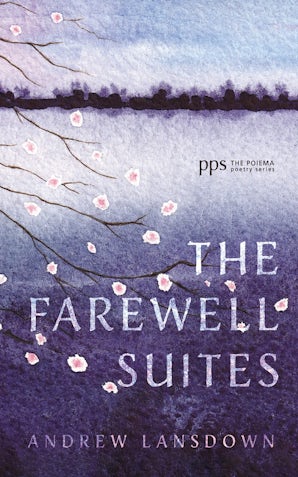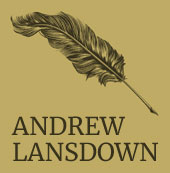
THE FAREWELL SUITES
Andrew Lansdown
Cascade Books
An Imprint of Wipf and Stock Publishers
(Eugene, Oregon, USA), 2024
Paperback & Hardback, 112 pages
Paperback ISBN: 9798385223909
Hardcover ISBN: 9798385223916
eBook ISBN: 9798385223923
BACK COVER BLURB
The Farewell Suites is a collection of poems dealing with death and grief and arranged in sets focused on different member of the poet’s family—a brother who committed suicide, a child who died before birth, a father who slipped into delirium as he slipped out of life. These finely crafted poems capture the movements of the heart and are stunning tributes to love, patience, acceptance and forgiveness. Though focused on the poet’s own loved ones, the poems speak of and to the hearts of all readers, expressing our shared anxieties and sorrows at the pass of those we love. The collection as a whole is deeply comforting, being shot through with both human warmth and heavenly hope. Indeed, Lansdown’s farewells anticipate reunion, when at last our mortality is overwhelmed by immortality.
Andrew Lansdown might be our finest living poet. Consider these features of his work: Its abundance, with sixteen published collections. Its unfailing clarity, without an obscure line anywhere. Its patent sincerity, with the poet never shielding his own heart. Its intellectual integrity, for no body of work has been more resistant to the cant of the times. … Its equally flawless perception of human relations, whether joyous or anguished. And through it all a blend of moral gravity, lightness of touch and tender compassion, so there’s always a saving grace at hand.
—PETER KOCAN, poet and novelist
It is immensely soul-satisfying to read Andrew Lansdown’s personal confessional poems on the deaths of five of his close family members. Lansdown brings an acute sensibility into one of the most difficult of poetic subject matters: one’s own immediate family. … Twenty-one closing poems form a compelling dialogue between Lansdown and his father on his daily visits to the hospital, with thirteen, by way of reflection, after his passing. Empowering and staggering poetry that stops time.
—JOE DOLCE, poet composer
Finely crafted, searingly honest, these poems peer deep within a place too often turned from, intensely and sensitively observing loss, grief and memory, probing questions unasked and offering acts of love. In these Farewell Suites are invitations to see that before grief is love, beyond death is life, and beneath loss is family for ‘time and eternity’.
—PAUL GROVER, editor, Studio
Andrew Lansdown’s new poetry collection invites us into his experiences as son and brother, reflecting profoundly on the dwindling of life, on slow death and sudden death, and on the grief of those left behind. Lansdown burrows into meaning, uncovering connections and resonances that we sense are true, although we had not identified them ourselves. He endows minuscule objects and single moments with metaphorical significance that readers can’t forget. It is an extraordinary gift, honed over decades of dedicated observation and wordsmithing.
—JILL IRELAND, academic and editor
Andrew Lansdown is the author of seventeen poetry collections, two poetry and photography collections, two children’s poetry collections, two short story collections and three novels. His poetry has been widely published in journals, newspapers, and anthologies and has won a number of prestigious awards. His first Poiema Poetry Series book, Abundance: New and Selected Poems (2020), was shortlisted for the Australian Christian Book of the Year Award. He is an adjunct lecturer in creative writing at Sheridan Institute of Higher Education.
THREE POEMS FROM THE FAREWELL SUITES
The Liminal Child
Now and then I yearn
for the child we lost, the one
without face or name,
who first leapt out of our love
and then leapt out of our lives.
It was hard on you,
child, but we also endured strife.
We couldn’t conceive
that when we loved you into life
you’d enter our hearts like a knife.
© Andrew Lansdown
Don’t Worry
‘It’s alright,’ I say. The orderlies
are wheeling his bed into the corridor.
‘They’re just taking you to another ward.’
I don’t say, the one for palliative care.
He turns his head and reaches towards
the sound of me. ‘But how will I find you?’
Everything about him gives me grief,
my father, gripped by frailties and fears.
‘Don’t worry,’ I say, ‘I’ll find you.’
And a little later for a little longer, I do.
© Andrew Lansdown
Falling
‘Hold me, Andrew!
Hold me tight!’
And I do.
I hug him hard,
half-lifting him
from his hospital bed.
My father. Delirium
has delivered him
to yet another dread.
This time, he tells me,
he is falling down,
down into darkness.
‘It’s alright,’ I say.
‘I’ve got you,’ I say.
‘You’re not falling.’
But he is, he is
falling—falling
into a fathomless pit.
And it isn’t my arms
he needs to feel
but those of the One
waiting to catch him.
© Andrew Lansdown
Two Reviews of the Farewell Suites
Review by Jill Ireland in Quadrant
Durable Hope
The Farewell Suites treats a series of deaths in Andrew Lansdown’s family: a brother who died young, another who took his own life, a baby who died before birth, and his parents. While death may seem a forbidding topic for a collection of poetry, the poet’s sources of hope emerge as durable despite – or perhaps because of – his honest plumbing of the depths of his family’s experience.
The Farewell Suites has a simple and meaningful structure. Each person lost has their own suite of poems. This helps readers to get their bearings, and sit in silence after each to ponder what has been revealed about the individual who died and how they fit in the jigsaw of the family. The cumulative effect is very powerful.
The length, breadth and depth of the poet’s faith in God permeate every poem but this does not preclude doubt, misunderstanding, even bewilderment at the fact of death and its reverberating impacts. Lansdown’s words illuminate that frozen moment when knowledge of a death arrives and the remainder of life has to be readjusted in a split second, but also in each minute and day that follows, until we deeply recognise how life is without them, and can let go of the “What if…?” questions.
Lansdown is a master of his craft. He is a dedicated and intense observer, seeing the minute and the magnified in the curve of one petal, the corners of a coffin, or a child’s one-word question. He has an uncanny ability to distil the significance of a single moment.
One poem will illustrate how Lansdown captures an everyday occurrence and shows how death jolts it into a deeper meaning, in a moment of stillness and recognition.
Gone
‘Gone!’ our son puzzles
while looking for milk in an empty cup.‘Gone!’ he says in amazement,
pointing to the light that has been switched off.‘Gone!’ he urges, demanding my attention
as the record finishes and the music fades.We usually laugh: one word
for so many occasions! ‘Yes,’ we say. ‘Gone. Gone.’But today it is a burden to us
to be reminded all day long.We are sealed off from joy,
seared by the news of your death.
Andrew Lansdown’s writing has had a persistent thread through the decades: he can see the truth of God’s nature in every detail. Yet at the same time he plumbs the alone-ness, the separateness of grief in all its immediacy and endurance. The paradox reverberates – the poet as brother, son and father, is in the moment alone, and yet we are right there with him, because of his gifts of seeing and saying, honed over a lifetime.
Through decades of teaching poetry to undergraduates, I have not found a poet who distils the essence of ageing as poignantly as Lansdown has done in The Farewell Suites. His startling frankness about the impact of cognitive decline, decreasing ability, distress and confusion, will bring epiphanies for readers with ageing parents. Lansdown brings the down-to-earth and the numinous into close contact, just as death does.
At times, the poet takes us with him into a single experience, pinned to the page by ordinary details, and then, with a single final word, reorients everything that we have observed:
Watching
I am watching, watching my father
walking…It catches me by surpriseto see him totter into open space
where no handhold can steady or save him.He is like a man traversing a tightrope
for the first time–and the last, should he fall,He is so absorbed in the exercise
he does not notice my absorption.I am taut as a rope stretched to breaking –
any moment I may whip out to catch him.And all the while I am watching him,
his walking-frame stands nearby, aghast.
There is not a poem in this collection that does not touch me deeply as only a poem can – capturing so exactly what it is to be human in a moment like this one. This is the power of Andrew Lansdown’s work on our sense of what it is to be human, to aspire, to mourn and to cherish.
Copyright © Jill Ireland
Jill Ireland is an academic and editor who lives in Bega, NSW
Quadrant, March 2025
Review by Paul Grover in Studio
‘Love and death are the two great hinges on which all human sympathies turn.’ B. R. Hayden
Within Andrew Lansdown’s new book of poems we discover the power of love intimately connected with the power of death. This very special collection explores the grief, loss and love experienced by the poet as he bears witness to the passing of members of his own family – an older brother at just 21, his two younger brothers, his unborn child, his mother and his father. Each one is given their own suite of poems, reflecting the poet as brother, father and son experiencing the searing pain, the loving forbearance, the anguished farewell and the heartfelt acceptance through this grief and loss. The poem, ‘Knocking’, focuses on the life-changing impact of loved ones:
Knocking
I was eighteen
when my older brother died.
I barely cried, but
from that time on, if not before,
I’ve heard death knocking at my door.
The collection is profoundly personal, intensely honest and richly discerning, speaking to all of us on our own life journey. This comment from the blurb of ‘The Farewell Suites’ invites us to walk with the poet,
‘…These finely crafted poems capture the movements of the heart and are stunning tributes to love, patience, acceptance, and forgiveness. Though focused on the poet’s own loved ones, the poems speak of and to the hearts of all readers, expressing our shared anxieties and sorrows at the passing of those we love. The collection as a whole is deeply comforting, being shot through with both human warmth and heavenly hope.’
The smallest events speak loudly, deeply and long,
The Last Entry
Ten days before she died
my mother wrote, ‘Colyn
cut my toenails today.’And with this last entry
in her notepad diary
she perfectly expressedthe contraction of the life
and the expansion of the love
she shared with my father.
Pathos
There is no bound to a father’s
suffering and love. Ask our Father.Ask mine. See how gently he is
tilting my brother’s wounded headto shave the stubble from his jaw.
Poems in ‘The Farewell Suites’ peer deep within a place too often turned from, intensely and sensitively observing loss, grief and memory, probing questions unasked and offering acts of love. In these poems are invitations to see that before grief is love, beyond death is life, and beneath loss is family ‘for time and eternity’,
In Memoriam
i
We knew something was wrong
because of the blood
but we had not expected this.
‘I can’t find a heartbeat,’
the doctor says. ‘I’m sorry.’ii
Dear child you died
in the secret safe place
alone. What did you suffer?
How could we have known?
Oh son, daughter, I’m sorry.iii
I collected the images
from the ultrasound, the record,
child, of your short life
and long death. I burnt them
to spare your mother. I’m sorry.
Peter Kocan, the Australian poet and novelist, in reviewing this new collection, says of Andrew Lansdown’s poetry,
‘Andrew Lansdown might be our finest living poet. Consider these features of his work: Its abundance, with seventeen published collections. Its unfailing clarity, without an obscure line anywhere. Its patient sincerity, with the poet never shielding his own heart. Its intellectual integrity, for no body of work has been more resistant to the cant of the times…. Its equally flawless perception of human relations, whether joyous or anguished. And through it all a blend of moral gravity, lightness of touch, and tender compassion, so there’s always a saving grace at hand.’
‘The Farewell Suites’ will sing in your heart. It will comfort, it will challenge. It will lead you towards deeply personal reflections, and remind you of the power of poetry to speak to our innermost needs, memories and fears.
You should also seriously consider obtaining a copy of Andrew Lansdown’s recent collection of ‘new and selected poems’, titled ‘Abundance’. This is a special selection from eleven of his earlier collections. These poems will leave you richer, wiser, and deeply aware of the mysterious power of words. Before his passing in 2019, Les Murray declared Andrew Lansdown ‘one of our very best poets’, and this collection celebrates these words…in abundance. Just go to Andrew Lansdown’s website to purchase copy: https://andrewlansdown.com/
Copyright © Paul Grover
Paul Grover is the editor of Studio
Studio, Number 164, 2025

